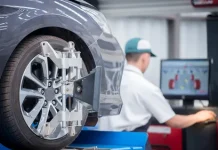Most drivers have been there: life gets busy, time flies, and that little sticker on your windshield saying it’s time for an oil change gets ignored. “It’ll be fine for a few more miles,” you think. But delaying an oil change isn’t just a minor maintenance miss—it can quietly snowball into major engine problems.
Let’s talk about what really happens under the hood when you skip an oil change, and why it matters more than you might think.
The Role of Motor Oil in Your Engine
Before we dive into the consequences, it’s helpful to understand why oil changes are important in the first place. Your engine is full of fast-moving metal parts that create a lot of heat and friction. Motor oil keeps those parts lubricated, reduces wear and tear, and carries away heat so the engine doesn’t overheat.
Over time, though, oil breaks down and collects dirt, carbon, and other particles. When it becomes dirty or too thick, it can no longer do its job properly. That’s why regular oil changes are so essential—they flush out old oil and replace it with clean, fresh oil that keeps everything running smoothly.
Dirty Oil = Engine Damage
When you skip an oil change, the oil in your engine eventually turns into a sludgy, grimy mess. Think of it like running with sand in your shoes—sure, you can keep going, but the damage builds up fast. Dirty oil not only loses its lubricating ability, but it also clogs small engine passages, causing components to grind against each other.
This can lead to overheating, increased wear on engine parts, and in extreme cases, complete engine failure. That’s a costly price to pay for something as simple and affordable as an oil change.
Your Gas Mileage Will Suffer
Skipping an oil change doesn’t just hurt your engine—it hits your wallet in another way, too. Dirty or old oil forces your engine to work harder than it should. When the engine is fighting against gunky oil, it becomes less efficient, and that means you’re burning more gas just to go the same distance.
If your car used to get 30 miles per gallon and now struggles to hit 25, your engine could be telling you it needs fresh oil. Over time, those few lost miles per gallon add up, especially with fuel prices fluctuating.
The Long-Term Effects Are Expensive
The scary part about skipping oil changes is that the damage isn’t always obvious right away. Your car might run fine at first, but internally, things are wearing down faster than they should. You might start hearing strange engine noises or notice that your car runs rougher than usual.
Eventually, this wear and tear can lead to serious repairs—think replacing piston rings, gaskets, or even the entire engine block. And those repairs cost thousands of dollars. Compare that to the price of a routine oil change, and it becomes clear: cutting corners here is not worth it.
If you’re not sure when your car’s next service is due, it’s worth scheduling an oil change just to be safe. One visit now could save you from a major headache later.
Warranties and Resale Value Take a Hit
Here’s something many drivers overlook—ignoring regular maintenance like oil changes can void your car’s warranty. Most vehicle warranties require that you stick to a maintenance schedule. If your engine fails and there’s no record of oil changes, the dealership or manufacturer might not cover the repairs.
Additionally, if you plan on selling your car someday, your maintenance history plays a big role in the resale value. A well-documented history of routine oil changes can make your vehicle more attractive to buyers and give you better bargaining power when it’s time to trade in.
Conclusion: Don’t Skip What Keeps Your Car Running
An oil change may not feel urgent, especially if your car seems to be running fine. But the damage from neglect builds slowly—and when it finally shows up, it’s often too late (and too expensive) to fix easily.
Taking care of your engine is like taking care of your health: small steps now prevent big problems down the road. Whether you drive a brand-new vehicle or a well-loved one with plenty of miles, routine oil changes are one of the simplest ways to keep it running strong.
Don’t wait for that dashboard light to come on or for things to start sounding “off.” Listen to your vehicle, and stay on top of the basics. Because when it comes to engine care, prevention is always cheaper—and smarter—than repair.










